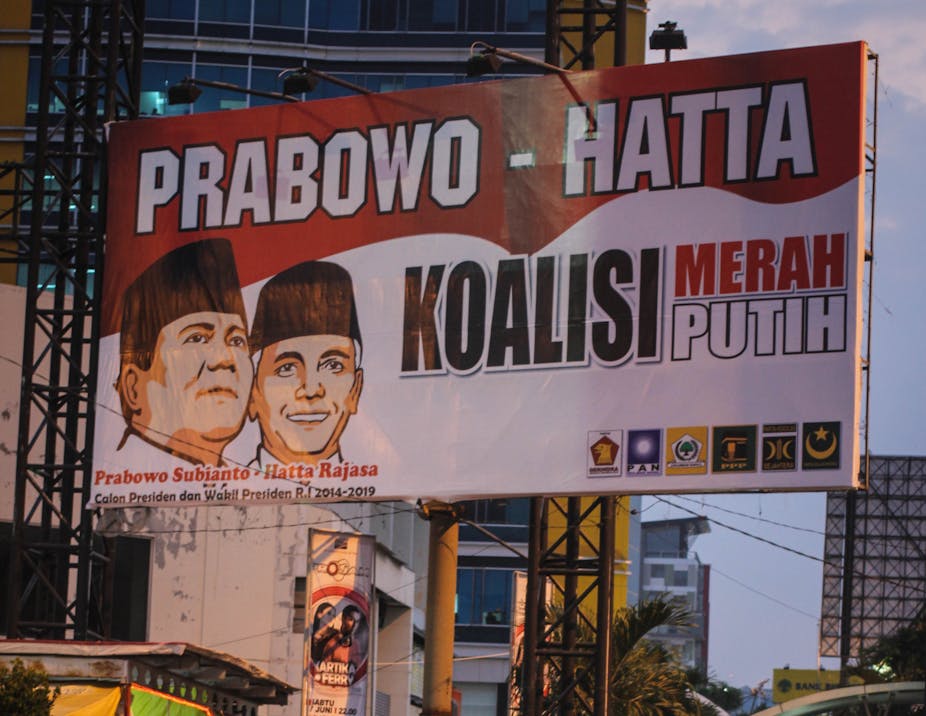Until recently, the prospect of Prabowo Subianto winning Indonesia’s presidential election seemed far fetched. All eyes were on ‘Jokowi’ (Joko Widodo), the Jakarta governor who has enjoyed a commanding lead in the polls for the past eighteen months.
The idea of Prabowo taking over the reigns of power in Indonesia was greeted with nervous laughter and expressions of ‘God help us!’ But with less than three weeks to election day on July 9, the unthinkable has happened. Polls now give the former general a good chance of taking over from SBY (Susilo Bambang Yudhoyono). It is time to take him seriously.
Putin in the making
Prabowo is not a democrat but a strongman. Former Indonesian defence minister Juwono Sudarsono has described him as a Putin in the making.
He played no part in the reforms that have transformed Indonesia over the past fifteen years from a dictatorship to the world’s third largest democracy. On the contrary, as former commander of the special forces, he was at the heart of the military machinery that kept Suharto, his former father-in-law, in power for more than three decades.
After Suharto’s fall, the military found Prabowo guilty of acting without orders in kidnapping democracy activists in 1997/98. Discharged from the army, he left for Jordan and spent three years in exile.
Upon his return to Indonesia, Prabowo tried and failed to be nominated as a presidential candidate for the establishment party Golkar.
He later founded the ultra-nationalist Greater Indonesia Movement (Gerindra) and contested the 2009 elections on a populist platform.
Gerindra did poorly in 2009. But in this year’s parliamentary elections, it won nearly 12 percent of the votes with the help of saturation advertising on TV and a social media onslaught.
In the political horse-trading that followed, Prabowo secured the backing of Golkar and four Islamic parties. Jokowi has the support of a slim coalition comprising Megawati Sukarnoputri’s election winning Indonesian Democratic Party of Strugle (PDI-P) and a smattering of mainly secular pluralist parties.
Prabowo’s nationalist rhetoric and theatrics on the campaign trail makes Jokowi looking distinctly provincial. In one massive open air rally in Jakarta, Prabowo arrived by helicopter and paraded on a Lusitano thoroughbred before a phalanx of his party ‘troops’ in white jackets and red berets.
In full flight, Prabowo can be frightening to behold. At a recent rally in Sumatra he shouted himself hoarse, providing a glimpse into what is likely to prove his Achilles heel – his volatile and sometimes violent temperament. Stories abound of his mercurial character and quick resort to physical force against those who cross him.
Return to autocracy
What kind of Indonesia can we expect if Prabowo wins?
Prabowo has made no secret of his admiration of Suharto. Gerindra’s manifesto promises a comprehensive “correction” of the Indonesian political system “to bring it into line with the 1945 Constitution and the national personality”.
Taken together with Prabowo’s frequent criticisms of Indonesia’s democratic system, it is clear that Prabowo aims to undo many of the democratic constitutional reforms implemented since the fall of Suharto.
If he succeeds, we can expect a more authoritarian, more centralised government in Indonesia, with greater powers vested in the president. Political freedoms, which have seen the flourishing of a diverse media landscape over the past decade, are likely to be curtailed.
We can also expect a government more intolerant of religious and ethnic minorities. Prabowo’s suspected involvement in orchestrating the anti-Chinese violence of May 1998 and his history of flirtation with extremist Muslim organisations has already triggered alarm among Indonesia’s ethnic Chinese and Christian communities.
In office Prabowo will have to contend with Indonesia’s vibrant and vocal civil society. Parliament and his coalition partners might also be expected to temper his autocratic impulses. His most powerful ally, though, will be Golkar chairman Aburizal Bakrie, a conservative oligarch who made his billions during the Suharto era.
Relations with Australia will almost certainly worsen under a Prabowo government. He will be seeking to play a more assertive role in the region. He will also be more likely to press Indonesia’s advantage in disputes with neighbouring countries, including Australia.
It is certainly hard to picture Prabowo reacting as benignly as SBY has to breaches of its borders by our navy and to Edward Snowden’s revelations on Australia’s spying on him and his inner circle.
Prabowo’s past will be a major liability. The US will remove him from its visa blacklist, imposed because of torture allegations, as it did for India’s Narendra Modi. But demonstrations and human rights criticisms will hound him whenever he travels abroad. And no-one dares to predict how the notoriously thin-skinned Prabowo will react to that.
Australian politicians and diplomats will be very nostalgic for the halcyon days of SBY.

